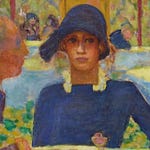Bitzer nodded again. They all nodded this way, just before they returned to their places at the bar. It was the nod that ended the encounter, but it was also a nod of admiration for my grandmother’s toughness. In the nod they saluted her bravery, without having to get into details over what she was being brave about, or having to start exploring the question of the value of bravery in the face of such a terrible certainty. They didn’t ask why she didn’t scream, why she didn’t seize the opportunity to damn her enemies, why she didn’t hire a muscular young man with clear blue eyes and a carefree smile to come in and rub her with olive oil—nor would it have occurred to them to ask, because they knew that she wouldn’t have done anything like that. She was a Brave Woman. She was a Good Woman. She was solid and sturdy. You could count on her.
In fact, many of these men, and their women, knew firsthand that they could count on her. They had been the beneficiaries of my grandmother’s goodness. She did a lot of USO work during the Second World War, and when her own firstborn son was killed she threw herself into the work with redoubled vigor, making it her particular charge, a duty she assumed on her own, to lend her shoulder to the mothers, to help prop them up, to give them something of her strength and optimism. Sometimes, in the misery of their darkest nights, they may have thought Grandmother’s optimism was foolish or unrealistic, but they couldn’t accuse her of not knowing what they were going through, and when they thought of her own suffering and how well she bore it, they felt the same kind of mute admiration that their men now felt for her when they encountered my grandfather at Corinne’s.
Corinne’s was a bar that women—and to the men at the bar women meant “wives”—would not go to, so the men carried their stories about my grandparents home with them, and they told them to their women, each in his own way, in dozens of variations. These were people who ordinarily spoke little, who passed whole evenings together in silence. My grandmother gave them something to talk about. For that, they were a little deeper in her debt.
Bitzer had gone back to the bar. The courtesy call had been made. They were leaving Grandfather to his thoughts.
Ariane walked in. It was her night off, but she had dropped in at Corinne’s anyway to see who was there, since she didn’t really have anywhere else to pass an evening.
“Busman’s holiday?” asked Red.
“What?” said Ariane.
“Busman’s holiday,” said Red, levering the cap off a bottle. He set a beer in front of her. “The bus driver gets a vacation—so he takes a bus trip. Get it? Busman’s holiday.”
“Oh, yeah,” said Ariane. “My father says that. I never got it before.” She looked into the mirror, saw my grandfather in his accustomed place, sitting alone, and said, “Give me a rum and Coke, Red, will you?”
“Oh, sorry,” said Red, reaching for the beer he’d put in front of her.
“No, no,” said Ariane. She put a hand on her beer. “I mean for John.”
“Oh, sure,” said Red. “Sure.”
Ariane put some money on the bar. Red waved her off. She pushed it toward him. She had never bought a man a drink before.
She arrived at Grandfather’s table without his even noticing her.
“The usual?” she asked, putting the drink in front of him.
He looked up, surprised and confused. “I didn’t—” he began.
“This one’s on me,” she said. She put it in front of him and sat down. “How’s she doing?” she asked.
“Hanging on,” he said, automatically. He looked into his drink.
This was the brief period, in the ritual performance of the duty of inquiring after Eleanor, when everyone kept his eyes down, confirming the fact that in the face of death there was nothing at all one could say. Instead, Ariane put her hand on my grandfather’s hand.
“It must be hard,” she said. Her voice was low, but distinct—no mumbling, no embarrassment to muffle what she had to say.
Grandfather looked at her. I would like to think that he didn’t see what all the rest of us saw when we looked at her, but how could that be? Even with his eyes filmed with grief, he would have to have seen some of the dark-eyed sexiness that could make a lusty young boy prone to a certain kind of manly wishful thinking. He can’t have failed to see it, but I think he must have been able to see beyond it.
He let out a sigh. “The hardest part,” he said, slowly, because he had kept himself from saying anything like this for so long, and he wasn’t quite sure that he ought to say it now, couldn’t be sure that saying it wouldn’t crack his shell irreparably, “is—”
He swallowed. Ariane saw the look in his eyes, that look of being near to tears that he wouldn’t allow himself to shed, and she squeezed his hand.
“—not being able to do—anything. Nothing that will change—things. The outcome—you know what the outcome will be. It’s the inevitability that’s so hard. The certainty of it.” He looked at Ariane, with those smart gray eyes that always seemed to see through me when I had broken something I shouldn’t have touched, and he saw that she didn’t quite know what he meant. “I mean that I don’t know how to tell her what’s happening to her, really happening to her,” he said. “I’ve been stalling—stalling for time.”
He chuckled. He shook his head. He was laughing at himself. Ariane didn’t know what to say, but as it turned out she didn’t have to say anything, because Grandfather suddenly began telling her everything (in the same low voice, I imagine, that he used to use with me, years earlier, when he would tell me a story before I fell asleep on nights when we slept aboard his boat, anchored in the clam flats, in the rocking silence, with the water lapping against the hull and the handle of a clam rake poking me in the ribs).
[to be continued]
Have you missed an episode or two or several?
You can begin reading at the beginning or you can catch up by visiting the archive or consulting the index to the Topical Guide. The Substack serialization of Little Follies begins here; Herb ’n’ Lorna begins here; Reservations Recommended begins here; Where Do You Stop? begins here; What a Piece of Work I Am begins here.
You can listen to the episodes on the Personal History podcast. Begin at the beginning or scroll through the episodes to find what you’ve missed. The Substack podcast reading of Little Follies begins here; Herb ’n’ Lorna begins here; Reservations Recommended begins here; Where Do You Stop? begins here; What a Piece of Work I Am begins here.
You can listen to “My Mother Takes a Tumble” and “Do Clams Bite?” complete and uninterrupted as audiobooks through YouTube.
You can ensure that you never miss a future issue by getting a free subscription. (You can help support the work by choosing a paid subscription instead.)
At Apple Books you can download free eBooks of Little Follies, Herb ’n’ Lorna, Reservations Recommended, and Where Do You Stop?
You’ll find overviews of the entire work in An Introduction to The Personal History, Adventures, Experiences & Observations of Peter Leroy (a pdf document), The Origin Story (here on substack), Between the Lines (a video, here on Substack), and at Encyclopedia.com.












